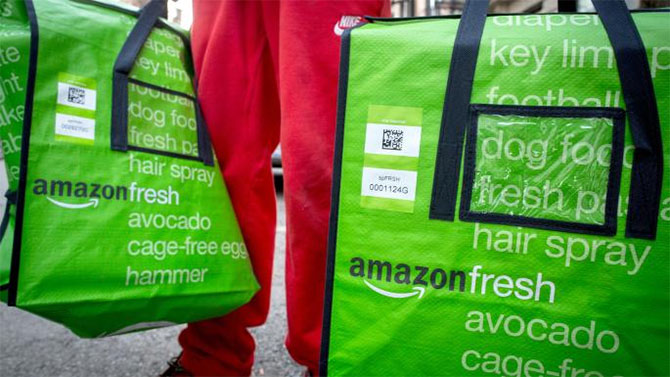Among all the geographies where Amazon is fighting regulators, India is the only place where its lines are also tangled in a major corporate battle.
Subhomoy Bhattacharjee reports.
Several regulators are being drawn into the battle being fought by Amazon, Walmart-owned Flipkart and Reliance Retail for a dominant position in the fast growing Indian e-commerce market.
This overlap is significant.
Among all the geographies where Amazon is fighting regulators, India is the only place where its lines are also tangled in a major corporate battle, this one with India’s largest company by market capitalisation over the acquisition of Mumbai-based Future Group’s retail chain, the country’s second largest.
No other corporate entity in any country offers a challenge to Amazon’s hegemony in a way Reliance Industries does — and the final hearing of an arbitration case filed at the Singapore International Arbitration Centre between the two may decide at least some of these issues.
This legal battle between one of the world’s most powerful corporations and one of India’s most powerful conglomerates could be complicated by a host of other developments.
One is the Competition Commission of India’s (CCI’s) investigation into Amazon and Flipkart’s business practices.
The other is the anti-trust investigation that Amazon, along with Apple, Google and Facebook, face in the US, not least because Google and Facebook are stakeholders in the Reliance group’s Jio Platforms with 7.73 and 9.93 per cent, respectively.
The Indian stock market administration and corporate tribunals are also involved in this battle.
Commerce Minister Piyush Goyal recently used the term “forum shopping” against Amazon and Flipkart, which refers to the practice of offending parties choosing between two courts in a country’s legal system. “…They should let the Competition Commission of India investigate if they were doing honest business… the reluctance shows they weren’t doing it right,” he said.
Goyal was responding to appeals by Amazon and Flipkart to a division bench of the Karnataka High Court against a single-judge bench order of the same court that had vacated a stay these companies had obtained against CCI’s investigation.
CCI, however, does not report to Goyal but to the ministry of corporate affairs headed by Finance Minister Nirmala Sitharaman.
The minister’s comments against the two could, therefore, possibly be an indication of how the government views the case.
The corporate battle lines were drawn when Amazon filed an arbitration case against the Future Group in March this year.
This was after Reliance Retail Ventures (RRVL), the group’s retail arm that owns the Reliance Fresh chain, paid Rs 24,713 crore in August 2020 to acquire six companies of the Future Group.
Amazon contested this deal saying it had the first right of refusal to any deal with the Future Group via a 49 per cent stake in Future Coupons that it acquired in 2019.
Though the CCI has cleared the RRVL-Future Group deal, Amazon has not filed an objection with the Indian fair market regulator but moved Singapore, presumably because orders under the Indian competition laws cannot be the subject of arbitration in India.
The companies involved in the battle are, therefore, bracing for a busy July.
These challenges and counter-challenges are a battle for getting the largest slice of the Indian e-commerce market, expected to reach $188 billion by 2025, according to accountancy Grant Thornton, from about $35 billion now.
But more than one regulator is being drawn into this particular battle.
The National Company Law Tribunal (NCLT) has to issue orders on Reliance Retail’s plea to seek shareholders’ approval for the deal with the Future Group.
This month, it reserved its orders on approving the merger.
NCLT permission is needed for the shareholders and creditors to consider and approve the proposed merger deal.
Because of the delay, Reliance Retail has extended what is known as “long stop” date, the date by when all the conditions precedent for a deal have to be met for the transaction to be completed.
In November last year, meanwhile, the National Stock Exchange (NSE) had pulled up Future Group for not making timely market disclosures about efforts by Amazon to block the asset sale.
And if the arbitration case by Amazon goes through in its favour, Indian courts will have a hard time deciding if such awards can be implemented against an Indian entity.
Then again, if an Indian data protection authority is established within this year, some strands of the argument between RRVL and Amazon could land there, too, since the government insists that data must be processed within India.
This could be difficult for Amazon.
The tussle with governments is a familiar territory for Amazon since it, along with Apple, Google and Facebook, face potentially similar charges in the US.
The US Congress is debating an expansion of the scope of antitrust investigations to take on these companies.
The attorneys general for California and New York and the US Federal Trade Commission are investigating Amazon, while the US Justice Department has been probing Apple.
But these will take time to be settled.
As a result, these issues could take time to be settled in India, too.
Antitrust cases, which is what the CCI investigation against Amazon and Flipkart amounts to, present difficulties for the regulators to prove conclusively.
In the case of Google, CCI gave its order only after the EU did so and in doing so stuck closely to the EU argument.
The fact that Facebook and Google are both stakeholders in RIL makes life difficult for CCI too as any anticompetitive evidence it marshals against Amazon and Flipkart could apply equally well against the social media giants since they, too, are two-way platforms for sellers and buyers.
Despite these caveats, the Indian face-off is possibly the most fascinating battle the internet economy has thrown up.
The obvious question is whether the involvement of multiple regulators could lead to regulatory capture by one or more of the parties involved.
“It is difficult to say, but given the wealth of regulators in the sector, it is quite possible for companies to do forum shopping,” said Avirup Bose, professor (competition law and policy) at Jindal Global Law School, OP Jindal University.
This year could well yield some answers.
Photograph: Brendan McDermid/Reuters
Source: Read Full Article

